| [内容速览]面对来势凶猛的金融风暴,香港特区政府使出杀手锏,在与索罗斯数度交锋中究竟发生了哪些惊心动魄的纠纷故事,当时的财政司司长曾荫权为什么会偷偷落泪?最后的大决战又暗藏着哪些玄机? |
News from CCTV.com (broadcast through Hongkong on May 29th): > > > > Click to watch the video. ….
In the face of the fierce financial turmoil, the Hong Kong SAR Government used its magic weapon. What thrilling dispute stories happened in several confrontations with Soros? Why did the then Financial Secretary Donald Tsang secretly cry? What are the mysteries hidden in the final Armageddon? "Through to Hong Kong" today broadcasts a special program "Ten Years of Memories of Financial Defence (Part II)".
 |
That financial storm was threatening in those days.
 |
How does the Hong Kong authorities resolve the financial crisis?
 |
Why did Donald Tsang secretly shed tears during the financial turmoil?
The financial storm that started to make waves in July 1997 swept across Asia like a volcanic eruption, and then stirred the whole world. Those countries that fell in the storm were mired in the quagmire of economic collapse and could only be slaughtered by others. However, Hong Kong, which is still standing in the storm, has already suffered from black and blue wounds in its financial market. At this time, the SAR Government has realized that although the impact of international speculators has been defused several times, a more violent storm has not yet arrived, and the SAR Government must meet the challenge with tougher measures and a more active attitude. It is also at this time that Soros, who has been waiting for the best opportunity, is constantly accumulating energy and preparing to launch a final blow to Hong Kong. The decisive battle of Hong Kong’s financial defense finally kicked off in August 1998.
Details:
Welcome to the special program on the 10th anniversary of Hong Kong’s return to China, which was produced by "Through Hong Kong".
The financial storm that started to make waves in July 1997 quickly swept through Asia like a volcanic eruption and then stirred the whole world. Those countries that fell in the storm were trapped in the quagmire of economic collapse and could only be slaughtered. However, Hong Kong, which is still standing in the storm, has also suffered from black and blue financial markets. At this time, the SAR Government has realized that although the impact of international speculators has been defused several times, a more violent storm has not yet arrived, and the SAR Government must meet the challenge with tougher measures and a more active attitude. It is also at this time that Soros, who has been waiting for the best opportunity, is constantly accumulating energy and preparing to launch a final blow to Hong Kong. The Armageddon of Hong Kong’s financial defense finally kicked off in August 1998.
On August 5, 1998, international speculators sold more than 20 billion Hong Kong dollars in one day. The Hong Kong Monetary Authority changed its passive approach in the past, and absorbed all of Hong Kong’s fiscal reserves to stabilize the foreign exchange market at the level of HK$ 7.75 to US$ 1, and the interbank market borrowing interest only increased slightly.
On August 6th, speculators sold more than HK$ 20 billion, and the Monetary Authority made a new move, not only accepting all the Hong Kong dollars according to the order, but also depositing them into the Hong Kong banking system, which played a role in stabilizing interbank lending interest and prevented the stock market from falling due to the increase in interest rate.
On August 7th, the Hang Seng Index fell by 212 points, or 3%, due to the poor performance of some blue-chip stocks that have announced interim results. In the following trading days, from 7th to 13th, the Hong Kong government continued to adopt the method of absorbing Hong Kong dollars to stabilize the interbank interest rate and thus achieve the goal of stabilizing the stock market. However, due to speculators’ short selling in the stock market, the Hang Seng Index finally fell to a low around 6,600 points, almost 10,000 points lower than a year ago, and the total market value evaporated by HK$ 2 trillion in one year. .
On August 13th, after the Hang Seng Index was suppressed to 6,660 points, the Hong Kong government organized Hong Kong capital and mainland capital to enter the market, and launched a battle with rivals for the August stock index futures contract. Speculators want to suppress the index, while the Hong Kong Government wants to hold the index, forcing speculators to fail to cash out their contracts in full before the end of August. After entering the market, the Hong Kong Government bought a large number of August stock index futures contracts shorted by international speculators, pushing the futures index up from 6,610 points before entering the market to 7,820 points on the 24th, which was higher than the average opening price of 7,500 points by investment speculators, and achieved initial victory. After the market closed that day, the Hong Kong Government announced that it had used the Exchange Fund to intervene in the stock market and futures market.
On August 14th, the Hong Kong government officially participated in the stock market and futures market transactions. In order to safeguard the Hong Kong dollar, the Hong Kong Government brought huge amounts of exchange funds into the stock market and futures market to directly confront speculators. The Hong Kong Government issued instructions to a number of securities firms in Hong Kong, such as Bank of China, Dodoli and Hesheng, to absorb a large number of blue-chip stocks in the Hang Seng Index, saying that it must raise the stock index in August by 600 points at all costs. The Hong Kong government’s reversal of the previous policy of "positive non-intervention" has dealt an unexpected heavy blow to speculators.
On August 24th, in order to break the speculators’ arbitrage plan, the Hong Kong Government took the initiative again and intervened in the market with HK$ 5 billion. On that day, the Hang Seng Index fluctuated violently, with a short-term plunge of 300 points, and then it was quickly pulled back. At the close, the Hang Seng Index rose by 318 points.
For the snipers and defenders of Hong Kong’s financial market, this is definitely a thrilling August. The curtain of the decisive battle has been opened, and the last moment of the decisive battle is coming. August 28th, 1998 is the settlement date of August contract of Hong Kong Hang Seng Index Futures. International speculators have a large number of futures orders that must be sold when they expire. If the stock market and foreign exchange market can stabilize at a high level or continue to break through, speculators will lose hundreds of millions or even more than one billion dollars. On the contrary, the tens of billions of Hong Kong dollars invested by the Hong Kong Government before will be thrown into the sea. Two rivals who have been fighting in the financial market for a whole year have finally waited for the final battle to decide life and death.
On August 27th, 1998, bad news kept coming from the global financial field. The US Dow Jones stock index fell by 217 points, and the European and Latin American stock markets fell by 3% ~ 8%. The Hong Kong stock market is facing a severe test. Under the command of Donald Tsang, the then Financial Secretary of the SAR, the Hong Kong Government injected about HK$ 20 billion a day, which steadily boosted the Hang Seng Index by 88 points, laying the foundation for the final decisive battle. On the same day, Soros’s Quantum Fund publicly declared that the Hong Kong Government would fail. This kind of public challenge to a government in the name of a company or individual, threatening to defeat a government, is unprecedented. Of course, there is intimidation in this, but it also shows Soros’s ambition and confidence. For this decisive battle, both sides are prepared, and no one can afford to lose.
August 28th may be the longest day in Hong Kong since there was a stock market.
At 10 o’clock in the morning, the transaction officially began. Only five minutes after the market opened, the turnover of the stock market exceeded HK$ 3.9 billion. Half an hour later, the turnover exceeded HK$ 10 billion, and by the close of the morning, the turnover had reached HK$ 40 billion, which was close to the record of HK$ 46 billion daily turnover set on August 29, 1997.
After the market opened in the afternoon, the selling continued unabated, and the Hong Kong government accepted all the orders, and the turnover climbed all the way, while the Hang Seng Index and the Futures Index remained above 7,800 points. As the bell rang at 4 o’clock in the afternoon, the constantly beating Hang Seng Index, Futures Index and transaction amount on the display screen were finally locked at 7829, 7851 and 79 billion respectively.
The Financial Secretary of the Hong Kong Special Administrative Region immediately announced that the Hong Kong Government had won the battle against international speculators and defending the Hong Kong stock market and the Hong Kong dollar.
If we leave aside the tragic war on this day, then the closing point of the Hang Seng Index in Hong Kong on the 28th is really a very dull number, which is even 93 points lower than that of the previous day. However, the significance of this figure to Hong Kong’s financial market is immeasurable. It has made Hong Kong’s stock market stand firm, leaving international speculators with no room for profit, and because their contracts have expired, they will inevitably suffer huge losses. This enter the dragon was later written into the financial textbooks of many countries all over the world, and it also became an important plot in many film and television dramas. However, no matter how it was deduced in actual combat in class or how it was performed in movies, it was not as wonderful as that day.
August 28th, 1998 is a heartbreaking day for many speculators. They came with the results of sweeping Southeast Asia and the ambition of sweeping Hong Kong, and their battle plan was not careless. Perhaps their only failure was to underestimate the determination of the Hong Kong SAR government. The Hong Kong government, which has always pursued a zero-intervention economic policy, actually carried 98 billion US dollars of foreign exchange reserves and entered the stock market and the foreign exchange market for a large-scale defense.
On the 28th, international speculative funds almost rushed out in an attempt to completely suppress the stock index, while the Hong Kong government took all the sales orders and held them to the stock market. The transaction amount on this day reached HK$ 79 billion, setting a record for a single day in the Hong Kong market.
After the decisive battle on the 28th, international speculators also made a fight against the trapped animals. They believe that neither financial pressure nor public opinion pressure can sustain the SAR Government for a long time, so they decided to transfer the contract from August to September, hoping to fight a protracted war with the Hong Kong Government. The SAR government immediately made a decision to continue to push up the price of stock index futures, forcing speculative capital losses to leave. On September 7, the Hong Kong Monetary Authority promulgated new regulations on foreign exchange, securities trading and settlement, which greatly restricted speculators’ speculation. On that day, the Hang Seng Index soared 588 points and stood at the 8,000-point mark. The losses of international speculators further intensified and eventually they had to retreat from Hong Kong.
It is estimated by Hong Kong market participants that the Hong Kong government invested more than HK$ 100 billion in the two-week stock market support operation, and concentrated on acquiring the shares of several major blue-chip companies in Hong Kong, becoming the major shareholders of several blue-chip companies in Hong Kong. After that, everyone knows the story. The Hong Kong market gradually recovered its vitality. In 1999, the Hang Seng Index returned to more than 10,000 points, and the Hong Kong government completely withdrew from the stock market, earning billions of dollars.
At that time, there were loud voices for and against the government’s abandonment of the "zero intervention policy" and the use of foreign exchange reserves to intervene in the stock market and futures market. Today, conservative economists still believe that this move has damaged the international image of Hong Kong as a free economy. Soros even launched world public opinion and attacked the Hong Kong government for "administrative intervention in the market", which violated the rules of the market economy. However, supporters believe that the economy manipulated by speculative capital is not a free economy, and the Hong Kong government entered the market precisely to break this manipulation. Donald Tsang, the Financial Secretary of Hong Kong who personally directed the market entry operation at that time, was even more deeply impressed.
Tsang Pau Siu-Mei, the wife of Donald Tsang, never asked about her husband’s official business. Even if Donald Tsang attacked an "international financial tycoon" in the financial turmoil, she knew nothing beforehand.
"That summer (1998), I went to Jiuzhaigou with him (Donald Tsang). At that time, he had been calling back to Hong Kong. When he and I went to Istanbul later, I only felt that he had been preparing something urgent. Halfway through the trip, he suddenly said that something important had come back to Hong Kong, leaving me alone in Istanbul, having no idea what had happened. After returning to Hong Kong, I realized that he had made a decision to enter the market. "
In a letter to his younger brother, Donald Tsang explained why he was in favor of entering the market.
"Why should I make this intervention decision? ….. If the government does not take action again, the stock market will fall to an unreasonable level because of manipulation, interest will continue to be high, the Link will continue to be under pressure, and economic recovery will only be in the foreseeable future. "
"You may ask, why doesn’t the government just announce the abandonment of the linked exchange rate? ….. Decoupling at this time will only make Hong Kong people lose their confidence in the Hong Kong dollar overnight. Hong Kong is an economy that relies heavily on exports. Once the linked exchange rate is lost, the stability of Hong Kong’s foreign trade will be immediately reduced, and the stock market and property market will plunge again, interest rates will soar, and the economic environment will further deteriorate. Even in the long run, it may not be the blessing of Hong Kong people. "
Donald Tsang later said that he shed tears the night before the government decided to intervene in the market. But as he said in his letter: government participation in the market is a dilemma. Now that I have made this decision, I must stick to my principles and accept criticism. ….. I will never take it lightly, and I will redouble my efforts to account to the people of Hong Kong. ….. Our life is very difficult. But I don’t believe that we Hong Kong people will lose.
At that time, Soros, who sang against Donald Tsang, gave people the impression that he was a very mysterious figure. Even the specific figure of his losses in Hong Kong has never been known, so there will always be some deductive elements when talking about him. At that time, there was a widely circulated saying that some people even mentioned in the article that in 1998, when Soros directed speculative funds to attack Hong Kong in turn, an incident that happened in the mainland of China surprised him.
In March 1998, Zhu, who just became the Prime Minister of the State Council, China? Ji held his first press conference in the Great Hall of the People in Beijing.
"If Hong Kong needs it, the central government will defend Hong Kong at all costs!"
This is the sentence that surprised Soros. It is said that Soros was drinking tea at that time, and when he heard this sentence, the cup in his hand fell to the ground. Although the truth of this statement cannot be verified, the firm support of the China government is a great encouragement to Hong Kong compatriots and a shock to international speculators.
In fact, in 1998, China’s economy also encountered many difficulties, such as declining export growth rate, sluggish domestic demand, and catastrophic floods. At that time, the whole world almost unanimously declared that China’s economy would struggle if the RMB did not depreciate. However, in a highly responsible attitude, the China government has made a solemn commitment not to devalue the RMB from the overall situation of maintaining stability and development in the region. To show sincerity, the China government also narrowed the floating range of the RMB against the US dollar.
While insisting that the RMB will not depreciate, the China government has adopted the policy of expanding domestic demand and stimulating economic growth, which has maintained the healthy and stable growth of the domestic economy and played an important role in easing the economic tension in Asia and promoting the economic recovery in Asia.
The financial defense war in Hong Kong, which happened at the end of last century, is still talked about by people, although there is no sword and shadow, and there is no smoke. When many economies collapsed in the face of the storm, the young Hong Kong Special Administrative Region withstood Soros’s indiscriminate bombing and kept the development achievements of Hong Kong for decades. If one day, we can read Soros’s autobiography, I wonder how he will describe the Waterloo in Hong Kong.
Editor: Liu Di



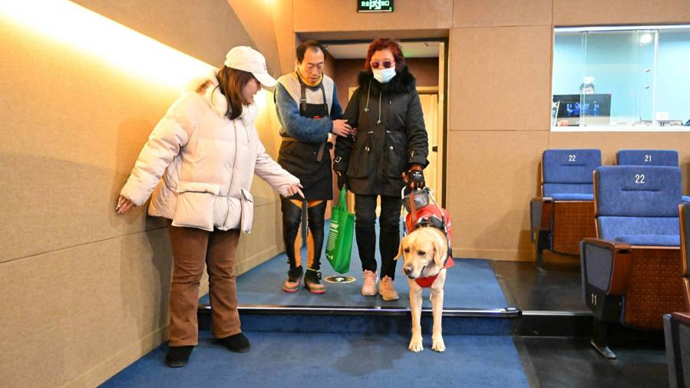
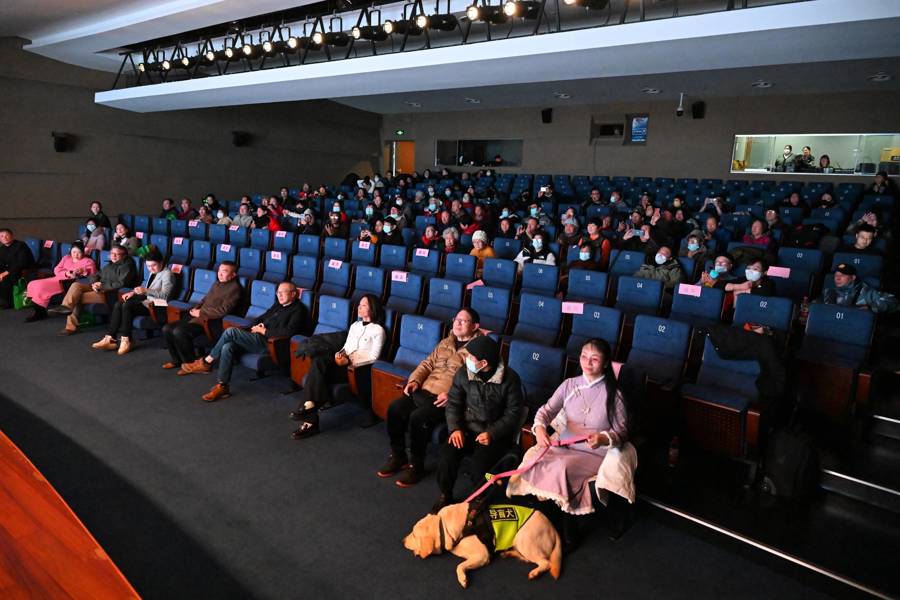 site of activity
site of activity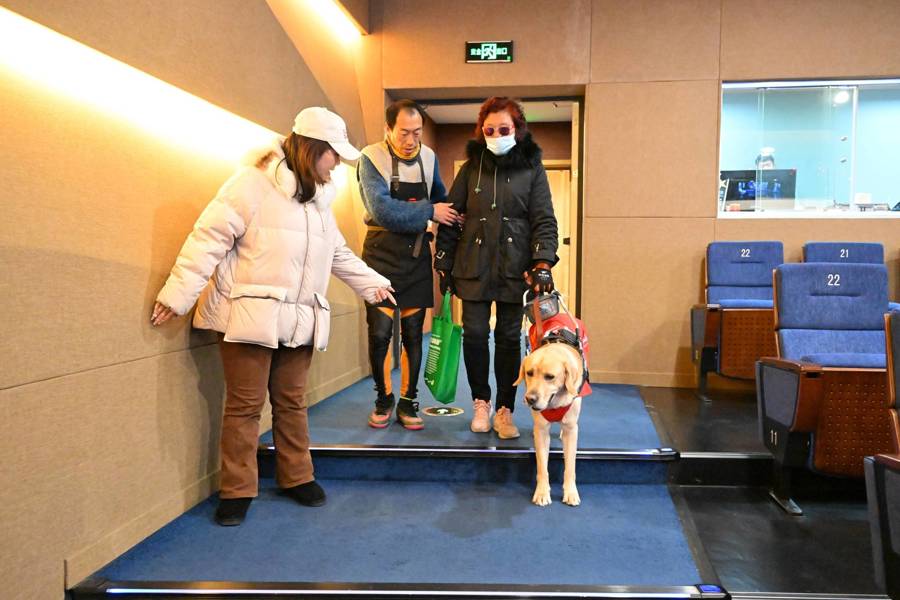 The audience led the guide dog into the stadium.
The audience led the guide dog into the stadium.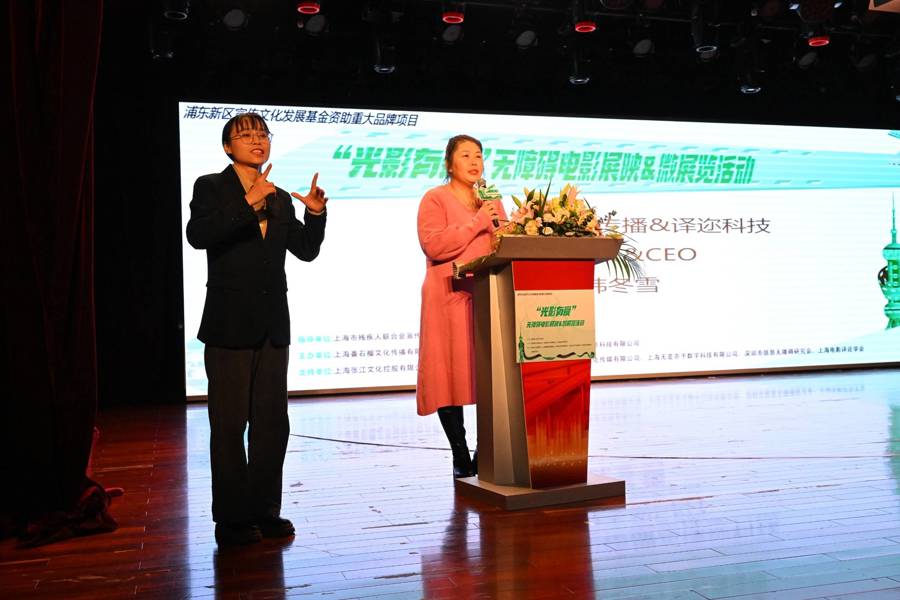 Sign language interpreters are available at the event site to serve the hearing-impaired groups.
Sign language interpreters are available at the event site to serve the hearing-impaired groups.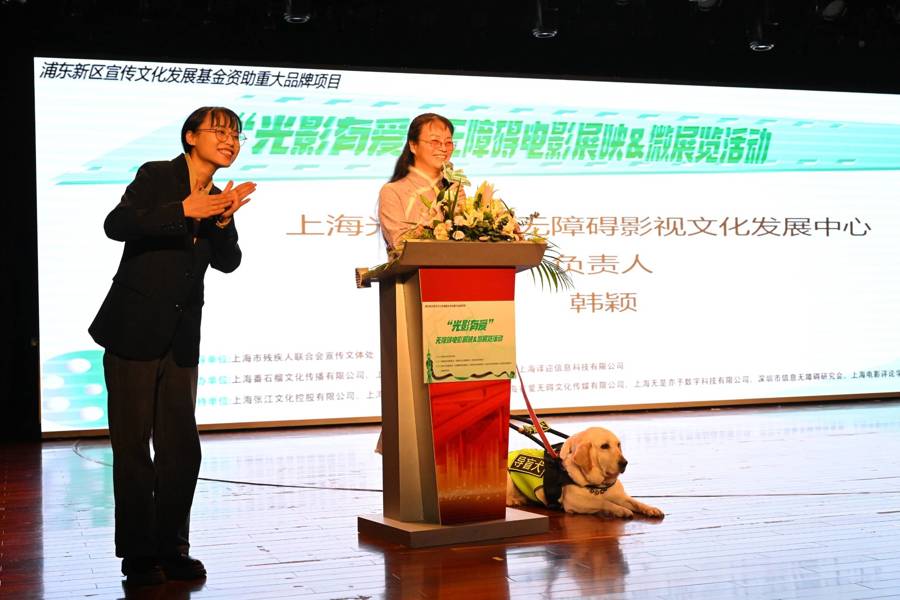 Sign language interpreters are available at the event site to serve the hearing-impaired groups.
Sign language interpreters are available at the event site to serve the hearing-impaired groups.